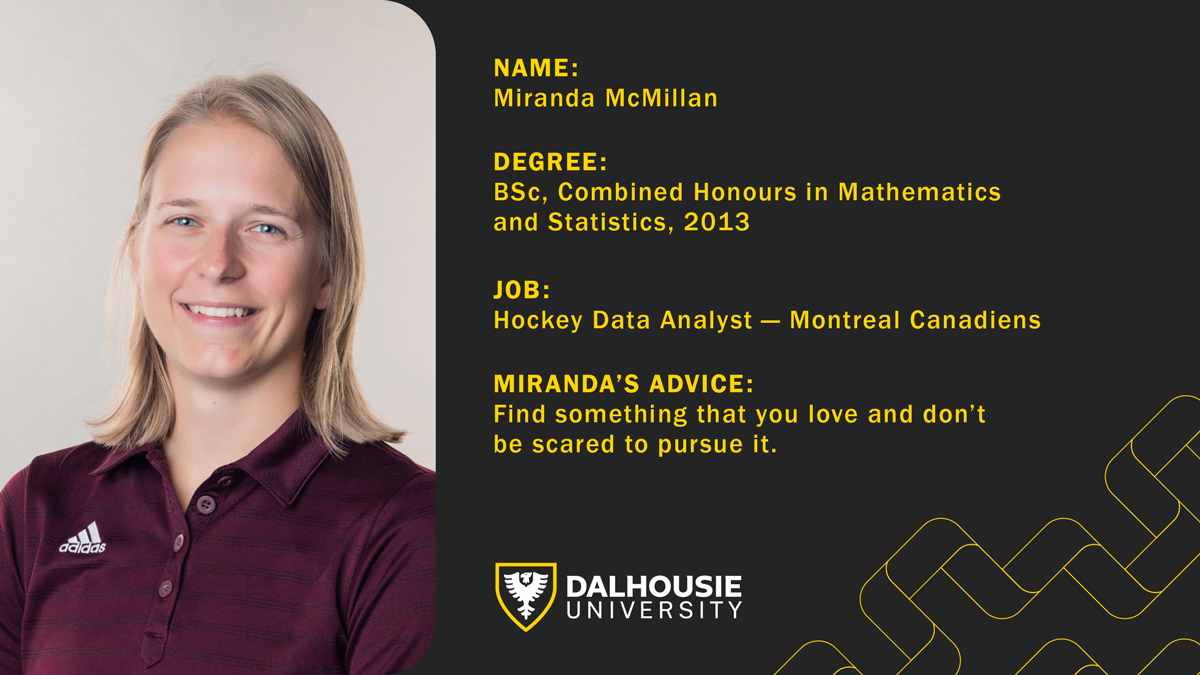Statistics
The Department of Mathematics and Statistics at Dalhousie University offers majors in Mathematics, Statistics, and Actuarial Science, with opportunities for one-on-one learning in smaller classes taught by award-winning faculty. Complete your undergraduate degree as a major, or consider completing an honours or co-op degree and/or earning one or more certificates if certain courses are taken as part of the program.
Our courses are accredited by the Statistics Society of Canada, and students can apply to receive an Associate Statistician designation upon graduating.
Your major map: Statistics
The Statistics Major Map highlights academic and co-curricular opportunities and provides an overview of how students can optimize their degree. Students are encouraged to connect with advising supports at Dalhousie and use the Academic Calendar and Timetable to create their course plan.
< 30 CREDIT HOURS/FIRST YEAR
- Complete required introductory courses in Statistics: STAT 1060 and Mathematics: MATH 1000/1010 and in other required subjects.
- See the first-year course planner worksheet for more information
- At the end of your first year, you can declare your major and register for second-year courses
30-60 CREDIT HOURS/SECOND YEAR
- You will start taking more core courses* in Statistics, deepening your knowledge of the discipline: STAT 2060, STAT 2080, STAT 2300, STAT 2430, STAT 2450, STAT 2600
- Consider combining your degree with another subject with a double major, minor, or certificate
60-90 CREDIT HOURS/THIRD YEAR+
- Aim to take 4-6 STAT courses* grouped around topics that interest you.
- Make sure you're on track with course requirements using DARS
- Apply for an honours degree ahead of your fourth year if you are considering graduate studies
90-120 CREDIT HOURS/FINAL YEAR
- In your final year, you should be taking 4-6 STAT* courses
- Complete any remaining requirements for a certificate or minor and check your degree audit to ensure you are on track to graduate
- Apply to graduate by Dec 1 for spring convocation and July 2 for fall convocation
*Note that not all courses are offered each semester or year and that course requirements may vary according to your degree type (major, double major, minor, honours). Be sure to keep track of these by consulting the academic calendar.
*After declaring your major, we strongly encourage you to connect with program advisors for course planning and any other questions related to your program.
< 30 CREDIT HOURS/FIRST YEAR
Your first year is a time to explore your interests and build your connections
- Enroll in a first-year interest group (FIGS) like Logic and Problem Solving and Innovation and Entrepreneurship in Science, or sign up to be mentored by an upper-year student.
30-60 CREDIT HOURS/SECOND YEAR
- Combine academic study with paid career-related work experience by enrolling in co-op
- Explore the myCareer portal to browse through work and volunteer opportunities on and off campus.
- See how you can get involved in community activities or math competitions associated with the department
60-90 CREDIT HOURS/THIRD YEAR+
- Consider applying for a summer research award. There are 70 Faculty-coordinated summer research awards available each year, on a competitive basis
- Other opportunities for senior undergraduate students include science communications internships, science innovation and entrepreneurship through SURGE, and leadership roles with your departmental society
|
< 30 CREDIT HOURS/FIRST YEAR
- Attend the Dal Science Welcome Party
- Attend the Faculty of Science Program Fair for help planning your next steps
- Consider joining DUMASS – Dal Undergraduate Math and Stats Society! Meet other like-minded students and participate in fun events
- Stuck on a stats problem? visit the department's learning center for some help
30-60 CREDIT HOURS /SECOND YEAR
- Reach out to award-winning faculty to inquire about volunteering in a research center lab across a variety of specialized topics
- Attend the colloquia and seminars held by the department, where students and colleagues share innovative research and ideas
60-90 CREDIT HOURS/THIRD YEAR+
- Consider running for a position with the Dal Science Society's Executive or with your student society
90-120 CREDIT HOURS/FINAL YEAR
|
< 30 CREDIT HOURS/FIRST-YEAR
|
30-60 CREDIT HOURS/SECOND YEAR
- Explore career paths and industries that spark your interest by attending an alumni panel discussion
60-90 CREDIT HOURS/THIRD YEAR+
- See which scholarships, bursaries, and prizes might be available to you through the department, on a competitive basis
90-120 CREDIT HOURS/FINAL YEAR
- Time to celebrate your achievements and graduate!
- Connect with the Bissett Student Success Success Centre career supports to get prepared for interviews, and more as your prepare to head out on the job hunt or to apply for graduate school
For any questions about your major, enrolling in a minor or certificate, summer research, or honours, speak with a program advisor!
Where your degree can take you
A BSc degree in Statistics provides great preparation for a variety of careers. Our undergraduate courses are approved by the accreditation committee of the Statistics Society of Canada, so that our graduates can apply for the Associate Statistician designation.
Statistics makes a great undergraduate degree with wide applicability and is an essential component of any program in the sciences or social sciences.
The skills and knowledge acquired through this program can be applied, but not limited to career paths in:
Finance, business management, commerce, engineering, government and policy, economics, computer science, science, manufacturing, public health, marketing, information technology, education, research, and science writing and journalism, among many more.
Core competencies gained
Discipline-related skills:
- Knowledge of various statistical theories, methods, and their applications
- Ability to apply abstract mathematical concepts to practical problems
- Ability to organize, analyze, interpret, present data, and extract knowledge from it to plan for the future and identify solutions to real-world topics
- Strong numeracy skills, and usage of various statistical software such as R, and other predictive modeling methods
Transferable skills:
- Academic writing and presentation skills
- Critical thinking and analytical skills
- Computer literacy
- Communication and interpersonal skills
- Time management
- Leadership and teamwork
- Basic statistical analyses
- Research skills
Possible careers and employment
Statistics Alumni can be employed within a variety of industries and have multiple career path options. These are influenced by the student's elective courses, experiential learning choices, and certificates. Some of the options below will typically require graduate-level training*, while some can be pursued following the completion of baccalaureate program only.
- Actuary*
- Accountant*
- Big data analyst
- Biostatistician
- Business metrics analyst
- Cryptographer
- Data analyst
- Data scientist*
- Database developper
- Economist*
- Financial analyst
- Logistics specialist
- Machine learning engineer*
- Market research analyst*
- Meteorological technician
- Operations researcher analyst*
- Survey researcher
- Statistician
- Teacher/professor*







